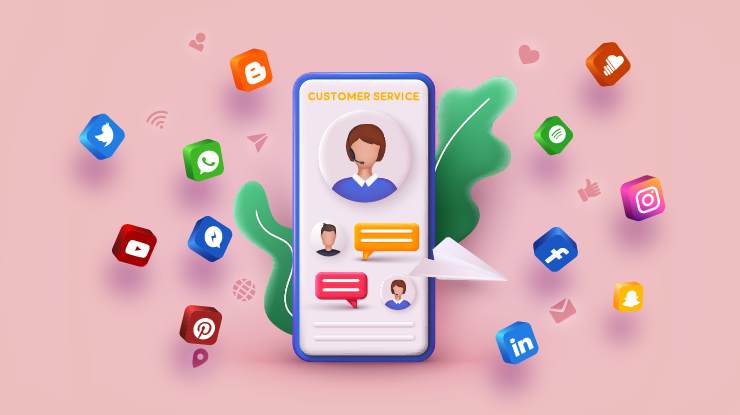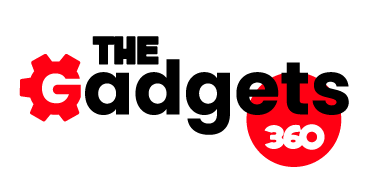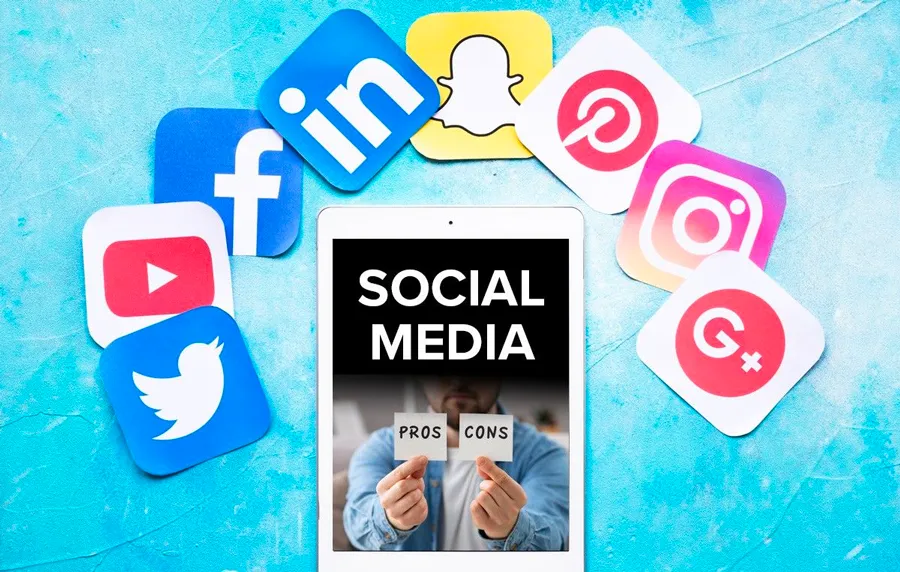As we navigate the 21st century, social media stands out as a pivotal force that has reshaped how we communicate, work, and connect.
Platforms like Facebook, Twitter, Instagram, and LinkedIn have seamlessly incorporated into our daily lives, becoming more than just tools—they are now central to our global culture. Their pervasive adoption is a testament to humanity’s inherent desire for connection and community.
Yet, these platforms’ enormous reach brings unparalleled opportunities and significant challenges. From nurturing global connections to the potential perils of misinformation and social media addiction, the digital realm is replete with contrasts.
This article provides a comprehensive exploration of the multifaceted world of social media, casting light on the pros and cons of social media and suggestions on harmonizing them.
Pros of Social Media
Social media has become an indispensable instrument in our digital age, offering a multitude of benefits that enhance our personal and professional lives.
But why is it so impactful?
Let’s answer that query with these five advantages of social media.
1. Connectivity and Networking

Social media functions as a conduit for establishing personal and professional connections across the globe. Among its many advantages, the ability to network beyond geographical confines through immediate communication stands out.
At a personal level, it enables users to maintain ties with friends, family, and acquaintances, irrespective of their location. This sense of connection, nurtured by platforms like Facebook and Instagram, solidifies relationships and offers a virtual realm for interaction and mutual support.
Beyond intimate connections, platforms like LinkedIn cater to professional networking. Here, users can connect with peers, potential employers, and industry specialists.
2. Information Sharing and Access
The internet has democratized access to information, with social media at the vanguard of rapid information-sharing.
And imagine what?
As people contemplate the pros and cons of social media, more are turning to platforms like Twitter to ingest news, as real-time dispatches are instantaneously available on any significant event or crisis occurring anywhere in the world.
During global crises, such as the COVID-19 pandemic, social media becomes a chief source of credible updates from health experts, government agencies, and international organizations. This access to reliable information on infection rates and public health guidelines empowered individuals to take necessary precautions in their own community and remain informed on relevant developments.
In the context of armed conflicts or wars, journalists and news agencies can share up-to-the-minute dispatches on peace negotiations, allowing people around the globe to remain informed.
While perspectives that complement mainstream media coverage empower individuals to share their experiences, accurate information, especially in the context of ongoing conflicts, is essential to assuring the safety of citizens. For instance, to ensure content and media disseminated about the conflict in Ukraine are reliable, Twitter has taken various measures like increasing convenience of access to updates and designating state-affiliated media.
3. Business Opportunities and Marketing
A new era of marketing and advertising opportunities has emerged among the pros and cons of social media with the advent of increased social media usage. With billions of users actively engaging on social media, businesses have unprecedented potential to reach and engage with their target audiences.
A crucial advantage of social media marketing is targeting specific audience segments. Instagram, in particular, has emerged as a potent platform for advertising, offering a visually engaging experience for users on the Explore page.
Here’s an example:
Sephora UAE, a beauty retailer that leveraged Instagram’s advertising capabilities to promote its products by targeting users interested in beauty and cosmetics.
One of Sephora UAE’s ad campaigns promoted a new cosmetics collection with Milk cosmetics, specifically targeting young adults interested in beauty products and residing in the UAE.
The results showed a “80% increase in favorability when adding Reels ads, compared with business-as-usual video campaigns” and higher brand awareness with Gen Z audiences (ages 18–24). This level of precision targeting via Reels ads as a standalone placement ensured that ads were delivered to the most relevant users, increasing the likelihood of conversions.
By leveraging Instagram’s precise targeting options, Sephora UAE reached a substantial number of potential consumers within the desired demographic, which you can also take advantage of with cost-effective and highly targeted ad campaigns on social media.
4. Customer Engagement and Support

While most websites have a contact page or customer service option, some consumers will message a company’s social media page.
Here’s an intriguing fact:
Consumers are reaching out to brands via social media at least monthly (and as frequently as weekly) for support.
A stellar example of a brand effectively using social media for consumer support is Southwest Airlines. The airline receives 3,000 mentions and hundreds of DMs daily, so they have a dedicated team to address any consumer queries on social media platforms like Twitter.
Through their various social media accounts, Southwest Airlines promptly responds to consumer concerns, sustaining an industry-leading response time of 15 minutes. By responding in real-time, Southwest Airlines addresses customer issues promptly and showcases its commitment to exceptional service.
The emphasis placed on customer service and swift response times enhances customer loyalty and generates positive word-of-mouth. When taking into consideration the pros and cons of social media, incorporating it as part of a comprehensive support strategy ensures that all inquiries and points of contact are addressed.
Cons of Social Media
Like a coin, there’s another side to social media – one with disadvantages. Let’s shed light on some of the cons of social media.
1. Privacy and Security Concerns
Security breaches are a developing issue as users appraise the pros and cons of social media. While social media platforms offer incomparable connectivity and interaction, they also expose users to hazards related to hacking and phishing.
One of the most concerning dangers associated with social media is data breaches, where unauthorized individuals obtain access to user data. High-profile cases of data intrusions have eroded public trust in certain social media platforms.
Information theft is another significant concern deriving from issues on social media.
2. Social Media Impact on Mental Health and Well-Being
Did you know:
According to the Pew Research Center, 69% of adults and 81% of teenagers in the U.S. use social media, and with that comes concerns about its impact on mental health.
Excessive use of social media has been linked to adverse effects on self-esteem and well-being, and new research has cast some insight into what risks are posed and how to mitigate online engagement. Although there are various pros and cons of social media, various studies have found connections between excessive social media usage and feelings of inadequacy about life, isolation, melancholy, and anxiety.
3. Misinformation and Fake News
Due to rapid shareability, misinformation has become a pervasive issue on social media, which can pose significant hazards to individuals and society as a whole.
A concerning aspect of misinformation is its potential to influence public opinion and behavior, as false information can affect people’s perceptions, leading to biased views or decisions that are based on inaccuracies.
Where was this notably evident?
The January 6 Capitol Riot, where fraudulent claims and narratives disseminated on social media platforms like Facebook played a role in inciting violence and exacerbating tensions.
During the 2020 U.S. Presidential election, Facebook groups experienced a surge of 650,000 posts delegitimizing Joe Biden’s victory between election day and January 6, with many perpetuating conspiracy theories and incitements to violence.
Read Also: Future of Social Networking Services
5 Tips for Balancing the Pros and Cons of Social Media
Navigating the digital domain requires a strategic approach to leverage the benefits of social media while mitigating its drawbacks. Here are five suggestions to do so.
1. Setting Boundaries and Limiting Screen Time

Social media has permeated nearly every aspect of our lives and obscured the lines between work and personal time, so you must set clear boundaries. You can prevent it from encroaching on other responsibilities by designating certain times of day to engage or peruse.
More benefits?
Limiting screen time can also include reclaiming time typically spent on social media to indulge in other interests you have. Learning to discern the pros and cons of social media if it is becoming overwhelming or detrimental to other aspects of your life is crucial to taking a step back and reevaluating how much time you spend on certain applications.
2. Prioritizing Privacy and Security
While users are increasingly sharing private or personal information online, which has evident risks, it is imperative that you take specific measures to safeguard your privacy on social media.
One method to prioritize your safety online is to evaluate your privacy and security settings as often as feasible. Every platform has different features that are updated at various times to control who can see your posts, profile, and other information, so customize them to correspond with your personal preferences.
Additionally, be wary of unsolicited messages and suspicious URLs in your DM requests to ensure that you’re not entering any third-party applications while on social media, which can prevent any collection or misuse of your personal information.
Lastly, using strong and distinctive passwords to ensure it isn’t readily guessable for your social media accounts is an often overlooked but essential step in protecting yourself online.
3. Promoting Healthy Social Media Habits
By adopting responsible social media practices, you can mitigate the potentially detrimental aspects of social media to maintain a more overall healthy balance.
Engaging in constructive conversations, barring spam or provocateur accounts, and supporting others’ accomplishments can create a more positive digital community.
What’s more:
Being selective about the type of content on social media can be essential to maintaining mental well-being, and limiting exposure to triggering content can reduce superfluous comparisons.
Being responsible about using social media can optimize your digital experience and protect your mental health. Balancing the pros and cons of social media by prioritizing real-life connections over online interactions ensures that your digital presence is fulfilling and makes a positive contribution to your life.
4. Engaging in Meaningful Online Interactions
While social media platforms offer various opportunities for connection and communication, managing the quality of these interactions is how you can create meaningful relationships and cultivate a sense of community.
By actively listening to others, we demonstrate genuine interest and empathy for the thoughts and emotions conveyed by friends and followers. Taking the time to respond thoughtfully to others’ posts or communications can lead to stronger connections.
You can discover shared community and support within social media by prioritizing meaningful connections over superficial interactions.
5. Using Social Media Management Tools
:max_bytes(150000):strip_icc()/SocialMedia_Metamorworks-c4d21d4003a14b96ab6b0265840e35d4.jpg)
Navigating the myriad of social media platforms for both personal and professional interactions can be a complex endeavor. SocialPilot emerges as a solution, offering a comprehensive arsenal to optimize and enhance online activities.
With SocialPilot, users benefit from functionalities that facilitate content scheduling, analysis, and monitoring across various platforms. Rather than managing multiple social media sites, SocialPilot’s unified dashboard allows for composing and scheduling postings for several accounts, ensuring strategic content deployment and a consistent online presence.
Conclusion
Social media stands as a potent instrument in our modern world, providing unparalleled avenues for connectivity, disseminating information, fostering business expansion, and facilitating genuine consumer interactions.
Yet, its immense expanse is not without shadows. With pressing issues such as privacy intrusions, potential detrimental effects on mental well-being, and the prevalent spread of misinformation, the onus falls on users to navigate this digital realm with discernment and prudence.
As we embrace the many opportunities social media presents, it’s imperative to utilize it with a sense of responsibility, ensuring that its potential is harnessed for positive impact while preserving against its inherent challenges.













